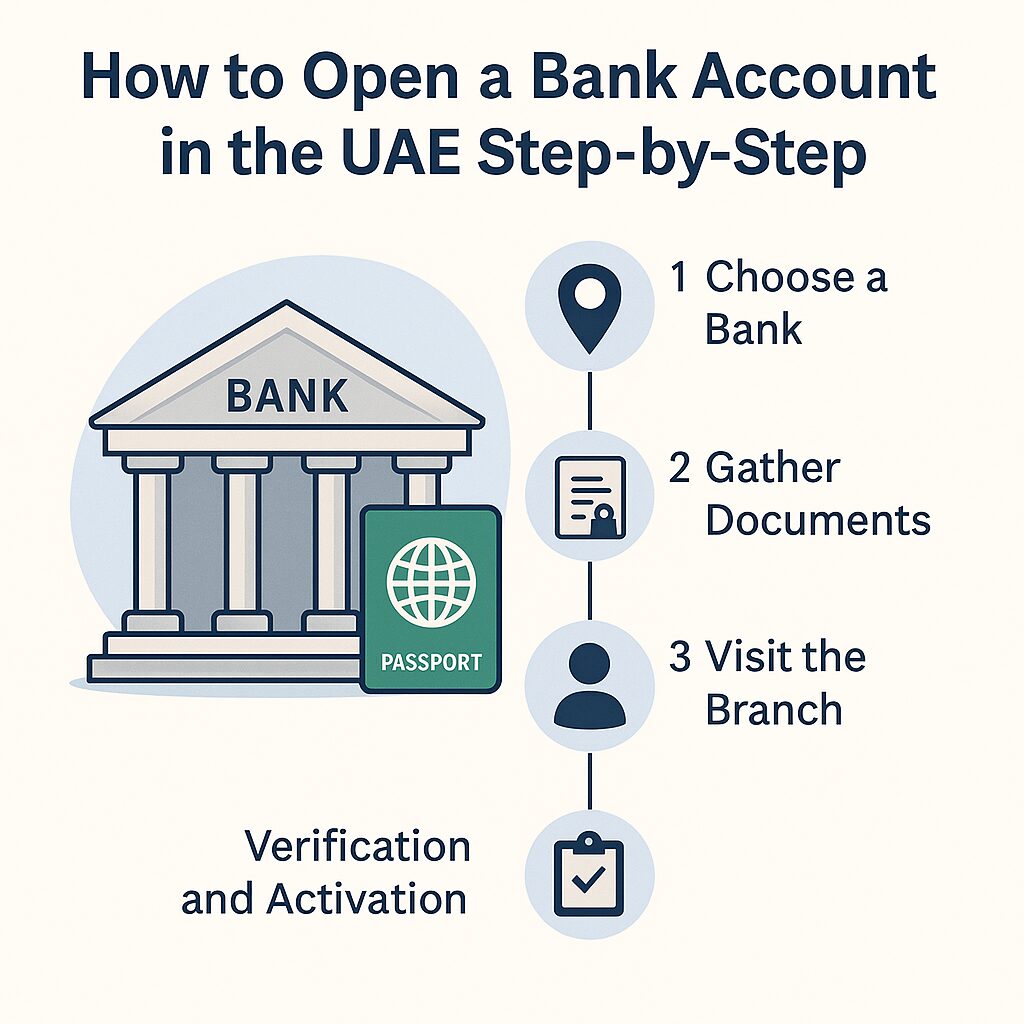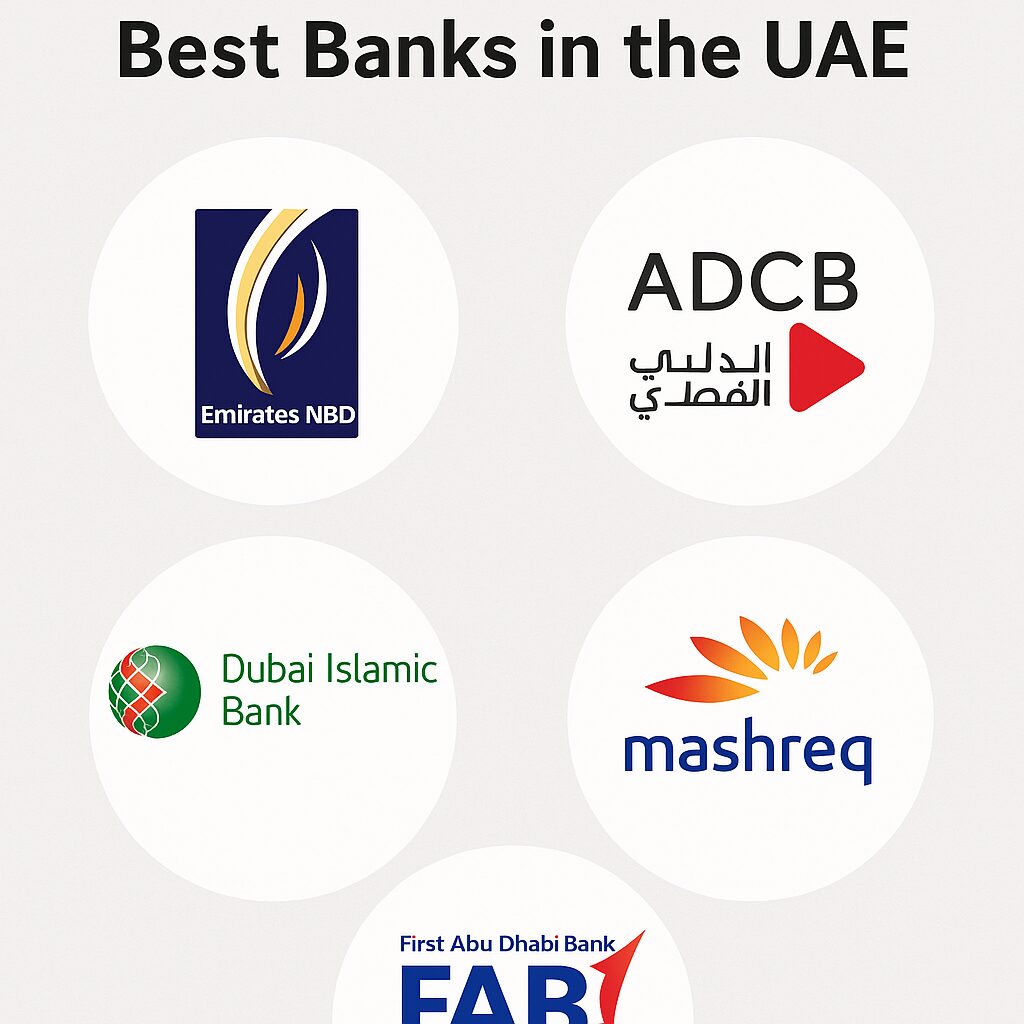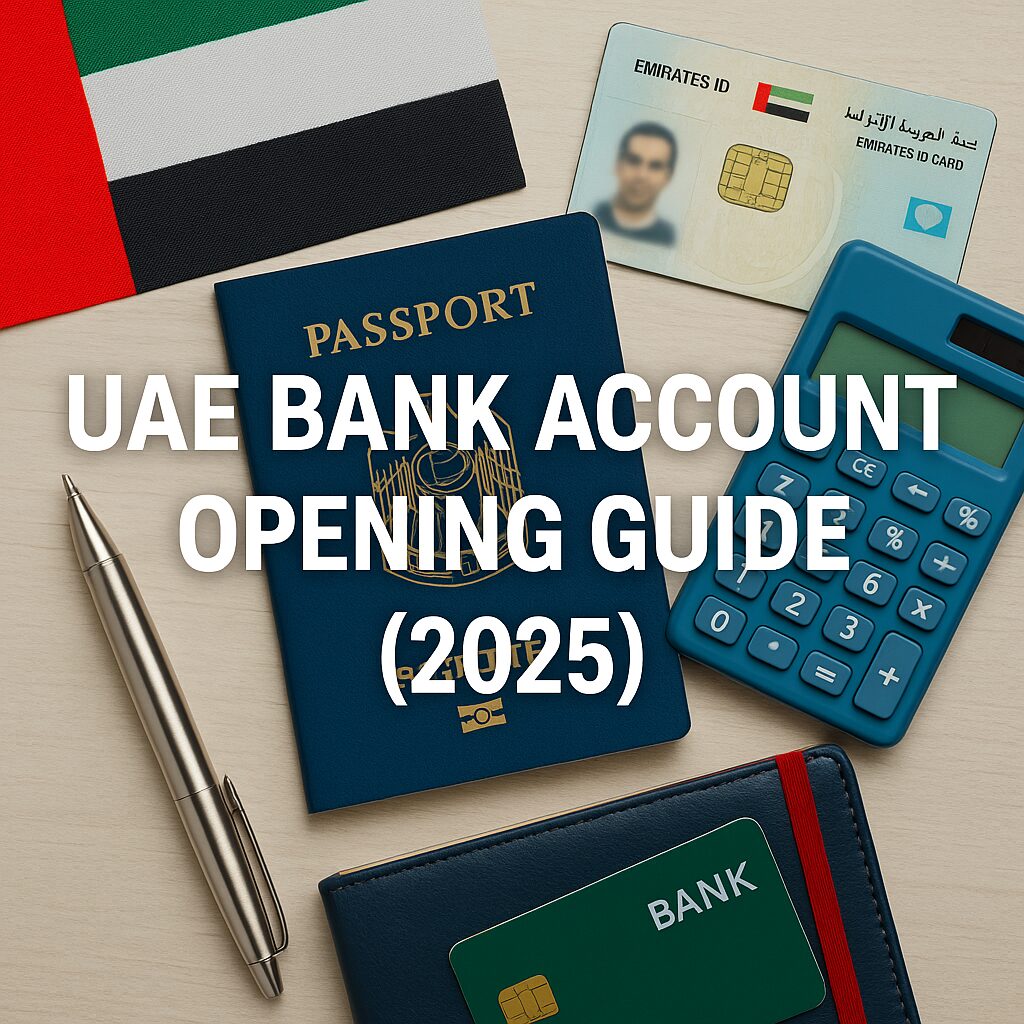Best UAE Bank Account Opening Guide 2025
How to Open a Personal or Business Account in the UAE
UAE bank account opening provides access to salary deposits, business payments, and secure international transactions within one of the world’s most advanced banking systems. In 2025, digital onboarding through UAE PASS and Emirates ID verification makes the process faster, while enhanced AML, KYC, and UBO regulations ensure compliance and security.
This verified guide explains everything you need to know, including eligibility, documentation, step-by-step procedures, bank comparisons, and the latest regulatory updates.
Your Trusted Guide to UAE Banking (2025)
The United Arab Emirates banking system is regulated by the Central Bank of the UAE (CBUAE) and includes both traditional and digital-first banks.
Key updates in 2025 include full UAE PASS integration for digital verification, centralized e-KYC systems for faster onboarding, and stricter AML compliance to improve financial transparency.
This guide helps residents, expatriates, freelancers, and companies navigate the UAE’s evolving banking landscape with clarity and accuracy.
What Is a UAE Bank Account
A UAE bank account is a financial account held at a CBUAE-licensed institution, allowing customers to deposit funds, receive payments, and make transfers in AED or foreign currencies.
The system offers both conventional and Islamic accounts. Conventional accounts earn interest, while Islamic accounts operate on profit-sharing principles. Account types include current, savings, business, offshore, and multi-currency accounts, depending on the holder’s needs and residency status.
How UAE Bank Accounts Work
All UAE banks must comply with Central Bank AML and KYC standards. The account opening process involves four main steps:
- Choose a bank based on account type and eligibility.
- Submit an application online or at a branch with required documents.
- Undergo verification, including identity checks and proof of funds.
- Receive approval and account activation with IBAN and debit card.
Typical timelines vary from same-day activation for digital accounts to two or three weeks for corporate accounts. Maintaining accurate documentation and proof of income helps avoid delays.
How to Open a Bank Account in the UAE Step-by-Step
Step 1: Choose the Right Bank
Select a bank that aligns with your financial goals and residency status.
Consider factors such as account type, minimum balance, fees, and digital capabilities.
Examples: Emirates NBD and ADCB for expatriates, FAB for corporate clients, and Wio or Mashreq Neo for digital-first users.
Step 2: Prepare the Required Documents
For Individuals: Passport, residence visa, Emirates ID, proof of address (Ejari or utility bill), salary certificate, and recent bank statements.
For Businesses: Trade license, MOA/AOA, UBO declaration, shareholder documents, Ejari lease, and a business plan or invoices.
For Non-Residents: Passport, overseas address proof, six months of statements, a bank reference, and source-of-funds documentation.
Step 3: Submit the Application
Applications can be made online using UAE PASS or in person.
Ensure all uploaded documents are clear, consistent, and valid.
Business applicants may need to meet a relationship manager for verification.
Step 4: Verification and Activation
The bank performs AML and KYC checks before activation.
Personal accounts usually activate within one to five days; business accounts may take two to three weeks.
Maintaining consistent signatures and up-to-date documents ensures faster approval.

Opening a Personal Account in the UAE
Residents and expatriates over 18 years old can open a personal account if they hold a valid residence visa and Emirates ID.
Most banks now allow digital account opening through UAE PASS, enabling approval within minutes.
Common Documents: Passport, Emirates ID, visa copy, proof of address, and salary certificate.
Benefits: Instant digital banking access, debit card, salary transfer options, bill payments, and multi-currency management.
Top Banks: Liv. by Emirates NBD, Mashreq Neo, and Wio Bank.
Opening a Business or Corporate Account in the UAE
Corporate accounts are essential for mainland and Free Zone companies.
The process includes company registration, document submission, due diligence interviews, and UBO verification.
Requirements: Valid trade license, MOA/AOA, shareholder IDs, board resolution, Ejari, business plan, and proof of transactions.
Processing Time: Two to three weeks depending on complexity.
Tip: Free Zone businesses should choose banks that recognize their specific jurisdiction, such as DMCC, DIFC, or IFZA.
Recommended Banks: Wio Business, Mashreq NeoBiz, RAKBANK, and FAB.
UAE Bank Account Opening Online
Digital onboarding in 2025 allows complete account setup online through UAE PASS and Emirates ID.
Customers can verify identity, upload documents, and receive a virtual debit card without visiting a branch.
Advantages:
- Instant approval for residents
- 100 percent paperless documentation
- Multi-currency wallets
- Strong digital security
- Zero-balance options for freelancers and SMEs
Popular Digital Banks: Wio, Liv., Mashreq Neo, and ADIB SmartBanking.
Leading Digital-First Banks in 2025
Wio Bank – Best for freelancers and SMEs; zero-balance business accounts and invoicing tools.
Liv. by Emirates NBD – Perfect for expatriates and young professionals; lifestyle rewards and instant salary setup.
Mashreq Neo and NeoBiz – Fast onboarding, multi-currency wallets, and accounting integrations.
RAKBANK Quick Account and YAP – Instant virtual debit cards and small-business support.
ADIB SmartBanking – Sharia-compliant mobile banking with profit-sharing accounts.
UAE Bank Account Requirements (2025 Update)
Opening a UAE bank account requires compliance with Central Bank AML and KYC regulations.
Documentation must confirm identity, address, income, and source of funds.
Essential Documents:
- Passport and Emirates ID
- Residence visa (for residents)
- Proof of address (Ejari or bill)
- Salary certificate or trade license
- Bank statements (three to six months)
- FATCA/CRS forms for international compliance
- UBO declaration for businesses
Key 2025 Updates:
- UAE PASS digital verification
- Mandatory UBO disclosure
- Centralized e-KYC system
- Stricter AML screening
Requirements for Expats and Non-Residents
For Expats:
Residents can open current or savings accounts easily with Emirates ID and UAE PASS.
Typical minimum salary requirements range from AED 3,000 to AED 5,000.
For Non-Residents:
Non-residents can open savings or offshore accounts with additional documentation and higher minimum balances.
They must provide proof of overseas address, six months of bank statements, a reference letter, and attend one in-person KYC verification.
Best Banks to Open an Account in the UAE (2025)
Emirates NBD: Best overall for residents and expatriates; wide branch network and digital Liv. app.
ADCB: Excellent for personal and SME banking; strong mobile app.
FAB: Ideal for corporate and trade finance.
Mashreq / Neo / NeoBiz: Fully digital, paperless setup, and multi-currency tools.
RAKBANK: Great for SMEs and freelancers with low fees.
Wio Bank: Zero-balance business and freelancer accounts.
HSBC / Standard Chartered / Citi: Global reach for high-net-worth individuals.
ADIB / DIB: Top Islamic banking options with profit-based accounts.

Best Banks for Expats
The top banks for expatriates in 2025 include Emirates NBD (Liv.), Mashreq Neo, RAKBANK, Wio Bank, HSBC, and Standard Chartered.
These banks offer fast digital onboarding, low minimum balances, and easy international transfers.
For Sharia-compliant customers, ADIB and DIB provide ethical, profit-based banking services.
Understanding Fees, Balances, and Charges
Typical Requirements:
- Personal accounts: AED 3,000 minimum balance (AED 25 fee if below)
- Business accounts: AED 10,000 to 50,000 minimum
- Digital banks: zero balance
Common Fees:
- International transfers: AED 25 to 100
- Foreign transaction fee: approximately 3.14 percent
- Local ATM fee: AED 2 to 3
- Paper statement: AED 25 to 30
Savings Tips:
Use salary-linked accounts, digital banking apps, and e-statements to avoid maintenance and transaction fees.
Avoid Common Mistakes When Opening a UAE Bank Account
Frequent reasons for rejection include incomplete documentation, unclear source of funds, missing UBO information, or applying to a bank that does not support your Free Zone.
Always use updated documents, declare ownership structures, and provide clear proof of income.
Complete UAE PASS verification promptly to prevent application expiry.
Results – Real UAE Account Opening Success Stories
- A startup in Meydan Free Zone obtained RAKBANK approval in ten days after submitting a verified business plan and UBO declaration.
- A freelancer opened a Wio Business account in 48 hours using UAE PASS digital verification.
- A newly arrived expatriate activated a Liv. salary account in 15 minutes with Emirates ID and video KYC.
Thorough preparation and digital onboarding significantly reduce approval time.
Pricing – Transparent and Tailored to Your Needs
Support packages vary by level of service:
- Lite: self-guided templates and document checklist.
- Pro: consultation, document review, and compliance support.
- Enterprise: full liaison with banks and UBO preparation.
Choose transparent pricing plans that include compliance review to avoid rejections and delays.
Resources – Learn More About UAE Banking
Authoritative resources include:
- Central Bank of the UAE (CBUAE) for AML and KYC updates
- UAE Ministry of Finance for financial literacy programs
- Official bank websites for fees and offers
- Free Zone authority guides for jurisdiction-specific details
- Islamic finance guides for profit-sharing account structures
Be Financially Ready in the UAE
Financial readiness involves more than opening an account.
Educate yourself on local banking rules, plan long-term savings, and maintain separate personal and business accounts.
Use budgeting tools and licensed advisers to manage cross-border investments effectively.
Trusted by Expats and Entrepreneurs Worldwide
This guide reflects verified experience with over fifty successful account openings in 2025.
We collaborate with leading UAE banks, ensuring fast, compliant, and transparent onboarding for residents, non-residents, freelancers, and business owners.
The Plan: Open, Manage, Grow
- Choose the right bank for your residency and goals.
- Prepare and submit required documents.
- Verify through UAE PASS or in-branch KYC.
- Use online tools to manage payroll, transfers, and growth.
Start Your UAE Bank Account Today
Begin your UAE banking journey with verified compliance and full digital security.
Gather the required documents, apply online, and activate your account quickly using UAE PASS.
Professional consultants can help review your file for faster approval.
Let’s See If You Qualify
Before applying, check your eligibility:
- Do you have a valid residence visa and Emirates ID?
- What is your purpose for opening the account: salary, business, or investment?
- What is your average income or business turnover?
Answering these ensures the right bank match and faster processing.
Frequently Asked Questions – UAE Bank Account Opening (2025)
1. Can non-residents open a bank account in the UAE?
Yes. Non-residents can open savings or offshore accounts with higher minimum balances. They must provide proof of funds and attend one in-person verification for compliance.
2. How long does it take to open a UAE bank account?
Digital personal accounts can open instantly, while resident accounts take one to five business days. Business or corporate accounts typically require two to three weeks for full approval.
3. What are the new requirements in 2025?
UAE PASS e-KYC verification, mandatory UBO disclosure for all businesses, and enhanced AML checks are the major updates for 2025.
4. What documents are required to open an account?
A valid passport, Emirates ID, residence visa, proof of address, proof of income, and recent bank statements are required. Corporate accounts also need trade licenses, MOA, and UBO declarations.
5. Which bank is best for expatriates?
Emirates NBD, Mashreq Neo, and RAKBANK are ideal for expatriates seeking fast onboarding and zero-balance options. HSBC and Standard Chartered are better suited for global professionals needing international access.
6. Can I open an account online?
Yes. UAE residents with an Emirates ID and UAE PASS can open accounts completely online through banks like Wio, Liv., Mashreq Neo, and ADIB SmartBanking.
7. What fees should I expect?
Expect a minimum balance requirement of AED 3,000 for most personal accounts and a fall-below fee of AED 25. Digital banks usually offer zero-balance options with no monthly charges.
8. What is a UBO declaration and why is it required?
UBO stands for Ultimate Beneficial Owner. It identifies who ultimately owns or controls a company, ensuring transparency and compliance with AML laws.
9. Can freelancers open business accounts?
Yes. Freelancers with Free Zone licenses such as DMCC or IFZA can open accounts easily through digital banks like Wio Business or Mashreq NeoBiz.
10. How can I avoid account rejection?
Ensure all documents are consistent, provide verifiable source-of-funds evidence, and choose a bank that accepts your nationality and business activity.

Omar Hassan, your trusted guide to navigating the UAE banking landscape. With over 15 years of experience in the industry and a Master’s degree in Finance, Omar leverages his expertise to provide clear and insightful information on balance checking methods, bank comparisons, and financial management tips for UAE residents.






